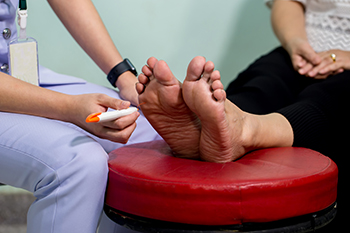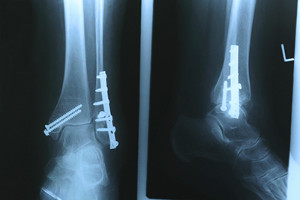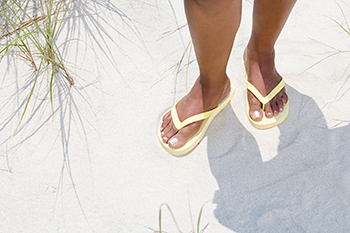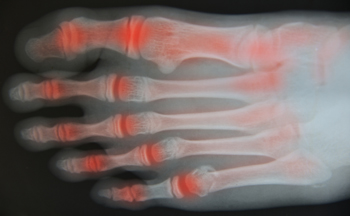Middlefield (860) 349-8500
Wallingford (203) 294-4977
Middlefield (860) 349-8500
Wallingford (203) 294-4977

Diabetic neuropathy most often affects the peripheral regions or extremities, including the feet, which tend to bear the greatest brunt of diabetic nerve damage. Prolonged periods of uncontrolled high blood sugar can trigger a number of problematic conditions that can afflict your feet, collectively termed the diabetic foot. This encompasses a range of issues, ranging from neuropathy related numbness and tingling to more severe complications such as ulcers and infections. Proper diabetes management, a healthy lifestyle, and regular check ups with a podiatrist are essential for preventing or managing this condition, particularly when it affects the feet and lower limbs. Early intervention and a proactive approach to diabetic neuropathy can make a significant difference in preserving your overall well being. If you develop a cut or sore on your foot that does not show signs of healing over time or becomes infected, it is essential to consult a podiatrist as soon as possible. Burning sensations, tingling, weakness, or pain in your feet are often early signs of neuropathy, and should be addressed promptly. For help with this condition, it is suggested that you make an appointment with a podiatrist, who is medically trained to treat diabetic neuropathy.
Diabetic foot care is important in preventing foot ailments such as ulcers. If you are suffering from diabetes or have any other concerns about your feet, contact Dr. Gordon Fosdick from Affiliated Foot Care Center. Our doctor can provide the care you need to keep you pain-free and on your feet.
Diabetic Foot Care
Diabetes affects millions of people every year. The condition can damage blood vessels in many parts of the body, especially the feet. Because of this, taking care of your feet is essential if you have diabetes, and having a podiatrist help monitor your foot health is highly recommended.
The Importance of Caring for Your Feet
Patients with diabetes should have their doctor monitor their blood levels, as blood sugar levels play such a huge role in diabetic care. Monitoring these levels on a regular basis is highly advised.
It is always best to inform your healthcare professional of any concerns you may have regarding your feet, especially for diabetic patients. Early treatment and routine foot examinations are keys to maintaining proper health, especially because severe complications can arise if proper treatment is not applied.
If you have any questions please feel free to contact our offices located in Middlefield and Wallingford, CT . We offer the newest diagnostic and treatment technologies for all your foot and ankle needs.

Stress fractures are tiny, gradual bone cracks caused by overuse or repetitive activities, common in athletes. Unlike sudden regular fractures, they develop over time, often affecting the feet and lower limbs. Risk factors include excessive stress, hard surfaces, and rapid changes in exercise intensity. Other causes are weak muscles, joint issues, osteoporosis, medications, poor footwear, and vitamin deficiencies. Symptoms include localized pain, swelling, tenderness, and discomfort during high-impact activities. Diagnosis involves a physical assessment, potentially followed by an X-ray or MRI. Treatment includes rest, compression, training modification, and low-impact activities. Supportive footwear, custom foot orthotics, anti-inflammatories, and exercises can also help. Surgery may be needed in severe cases. Ignoring stress fractures can lead to complete fractures, non-healing, bone necrosis, and surgery. If you are experiencing foot or ankle pain, it is strongly suggested that you make an appointment with a podiatrist who can properly diagnose the issue and provide treatment options.
Stress fractures occur when there is a tiny crack within a bone. To learn more, contact Dr. Gordon Fosdick from Affiliated Foot Care Center. Our doctor can provide the care you need to keep you pain free and on your feet.
How Are They Caused?
Stress fractures are the result of repetitive force being placed on the bone. Since the lower leg and feet often carry most of the body’s weight, stress fractures are likely to occur in these areas. If you rush into a new exercise, you are more likely to develop a stress fracture since you are starting too much, too soon. Pain resulting from stress fractures may go unnoticed at first, however it may start to worsen over time.
Risk Factors
Stress fractures do not always heal properly, so it is important that you seek help from a podiatrist if you suspect you may have one. Ignoring your stress fracture may cause it to worsen, and you may develop chronic pain as well as additional fractures.
If you have any questions, please feel free to contact our offices located in Middlefield and Wallingford, CT . We offer the newest diagnostic and treatment technologies for all your foot care needs.

Your profession, while providing livelihood and fulfillment, can significantly affect the health of your feet. For those in physically demanding roles, such as healthcare workers, construction laborers, or retail employees, prolonged periods of standing or walking can lead to fatigue, strain, and an increased risk of conditions like plantar fasciitis or bunions. Conversely, sedentary jobs that require long hours of sitting can contribute to problems like weakened calf muscles, poor circulation, and the development of blood clots in the legs, known as deep vein thrombosis Additionally, professions that involve wearing inappropriate footwear, like high heels or steel-toed boots, can lead to issues ranging from foot pain to chronic conditions such as ingrown toenails or neuromas. Regular foot care, including proper footwear selection, exercising, and taking periodic breaks to stretch and rest your feet, can mitigate the impact of your job on your feet. It is suggested that you consult a podiatrist for guidance tailored to your profession for advice on specific types of shoes to buy for the overall health of your feet.
While working on the feet, it is important to take the proper care of them. For more information about working on your feet, contact Dr. Gordon Fosdick from Affiliated Foot Care Center. Our doctor will treat your foot and ankle needs.
Working on Your Feet
Standing on your feet for long periods of time can cause stress and pain in your feet. Your whole body may experience change in terms of posture, back pain, bunions, callouses and or plantar warts. There are ways to avoid these conditions with proper foot care, smart choices and correct posture.
Positive Changes
Negative heeled shoe – Choosing this shoe type places the heel slightly lower than the ball of the foot. These are great for overall foot health. Find shoes that fit you correctly.
Go barefoot – Our feet were not designed to be enclosed for all hours of the day. Try to periodically expose your feet to air.
Eliminate Pain
Foot Exercises – Performing simple exercises, incorporating yoga and doing stretches are beneficial. This will allow increased blood flow to the area and muscles of the foot.
Achilles tendon – Stretching the foot out flat on the floor will relax the calf muscles and tendon. These exercises can be performed almost anywhere. Make sure you add these exercises to your daily regimen.
With a little bit of this information and knowing more about foot health, you will notice changes. Foot stretches and proper footwear will help with pain and prevent further issues.
If you have any questions please feel free to contact our offices located in Middlefield and Wallingford, CT . We offer the newest diagnostic and treatment technologies for all your foot and ankle needs.

If you are a fan of flip-flops, it is essential to consider their impact on foot health. While these airy sandals are convenient, they may not be the best choice of footwear because they offer minimal arch support, heel cushioning, and shock absorption, possibly leading to foot discomfort and pain. Wearing flip-flops forces your toes to grip tightly to keep the sandals on. Over time, this can lead to conditions such as hammertoe, where toes become permanently bent. Researchers have found that flip-flops can change your natural walking pattern, potentially causing pain and problems from your feet up to your hips and lower back. The majority of flip-flops have thin soles that offer little foot protection. This can result in increased heel-strike impact and foot discomfort. Flip-flops can also increase the risk of falls and injuries due to their minimal attachment to the feet. Substitutes for flip-flops that are better for your feet should fit snugly without being too tight, provide proper arch and heel support, and have ankle straps or toe rests to prevent slipping. In general, flat-soled shoes are not ideal for foot health. If you desire the comfort and ease of flip-flops but want to protect your feet, it is suggested that you make an appointment with a podiatrist for recommendations
Flip-flops can cause a lot of problems for your feet. If you have any concerns about your feet or ankles, contact Dr. Gordon Fosdick from Affiliated Foot Care Center. Our doctor will assist you with all of your foot and ankle needs.
Flip-Flops and Feet
Flip-flops have managed to become a summer essential for a lot of people. While the shoes may be stylish and easy to slip on and off, they can be dangerous to those who wear them too often. These shoes might protect you from fungal infections such as athlete’s foot, but they can also give you foot pain and sprained ankles if you trip while wearing them.
When Are They Okay to Wear?
Flip-flops should only be worn for very short periods of time. They can help protect your feet in places that are crawling with fungi, such as gym locker rooms. Athlete’s foot and plantar warts are two common fungi that flip-flops may help protect your feet against.
Why Are They Bad for My Feet?
These shoes do not offer any arch support, so they are not ideal for everyday use. They also do not provide shock absorption or heel cushioning which can be problematic for your feet. Additionally, you may suffer from glass cuts, puncture wounds, and stubbed toes since they offer little protection for your feet.
More Reasons Why They Are Bad for Your Feet
If you have any questions, please feel free to contact our offices located in Middlefield and Wallingford, CT . We offer the newest diagnostic and treatment technologies for all your foot care needs.

Arthritis is a common condition characterized by joint inflammation and can significantly impact the feet, leading to stiffness and pain. Incorporating specific foot exercises into your daily routine can help alleviate arthritis-related discomfort and improve mobility. One effective exercise is ankle circles, where you gently rotate your ankles clockwise and counter-clockwise. This helps maintain joint flexibility and reduces stiffness. Toe stretches are also beneficial. Gradually stretch your toes apart, then squeeze them together. This exercise can alleviate tension and improve toe dexterity. Rolling a tennis ball or a frozen water bottle under your foot can provide a soothing massage and help relieve tension in the arches and heels. Additionally, toe taps involve tapping your toes rapidly while seated. This exercise improves blood circulation, which can reduce pain and inflammation. Calf stretches can alleviate tension in the Achilles tendon and calf muscles. These are done by standing facing a wall, while placing your hands on it, and stepping one foot back, keeping it straight while bending the front knee. Switching sides can be done after holding for several seconds. Incorporating these exercises into your daily routine can promote foot health and provide relief from arthritis-related pain. If you suffer from foot arthritis, it is strongly suggested that you consult with a podiatrist who can ensure the exercises you are doing are safe and tailored to your needs.
Arthritis can be a difficult condition to live with. If you are seeking treatment, contact Dr. Gordon Fosdick from Affiliated Foot Care Center. Our doctor can provide the care you need to keep you pain-free and on your feet.
Arthritic Foot Care
Arthritis is a joint disorder that involves the inflammation of different joints in your body, such as those in your feet. Arthritis is often caused by a degenerative joint disease and causes mild to severe pain in all affected areas. In addition to this, swelling and stiffness in the affected joints can also be a common symptom of arthritis.
In many cases, wearing ill-fitting shoes can worsen the effects and pain of arthritis. Wearing shoes that have a lower heel and extra room can help your feet feel more comfortable. In cases of rheumatoid arthritis, the arch in your foot may become problematic. Buying shoes with proper arch support that contour to your feet can help immensely.
Alleviating Arthritic Pain
It is best to see your doctor for the treatment that is right for your needs and symptoms. Conditions vary, and a podiatrist can help you determine the right method of care for your feet.
If you have any questions, please feel free to contact our offices located in Middlefield and Wallingford, CT . We offer the newest diagnostic tools and technology to treat your foot and ankle needs.